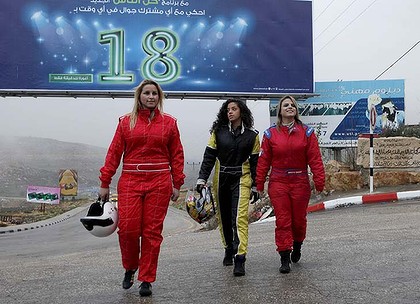UPDATES
Positive Palestinian racers profile couldn’t avoid token Israel swipes
January 24, 2012 | Daniel Meyerowitz-Katz

This weekend’s Fairfax papers included a report on an all-female Palestinian racing team by Ruth Pollard. While the piece was an interesting read overall, there are one or two small inconsistencies that are worth noting. In addition to this, there were a number of instances where the Age inserted small changes to make the tone of the article seem more anti-Israel. Some of these have been noted below.
Pollard profiles Noor Daoud, a Palestinian woman who won an Israeli formula-three competition last month. In the interview, Daoud explains how it is that she can no longer drive on the road.
”It is not the first time I have driven 200km/h – I lost my licence in 2009 when Israeli police caught me going that fast along the highway.”
Now she can only drive her modified black 328i BMW on the track, or at the practice area in the shadow of [the notorious – Age] Ofer prison in Betunia, where so many Palestinians have been tried before military courts and jailed.
It is curious that Pollard felt the urge to mention the nearby prison, it feels like she is trying to evoke pity for the woman who lost her license for driving her BMW at 200km/h. Regardless of this, to say that the Palestinians were “tried before military courts” is misleading – the entire West Bank is under Israeli military jurisdiction as to try Palestinians in Israeli civil courts would mean applying Israeli civil law to the West Bank, which would be akin to annexation. The military jurisdiction that Israel extends to the West Bank is because Israel does not intend to be there permanently. By contrast, Israeli civil jurisdiction applies in East Jerusalem, which is why, as Pollard mentions, Daoud’s East Jerusalem identity card allows her to compete in Israeli races.
Similarly, the following passage seems a little out of context:
Israel’s military occupation permeates every part of Palestinian life, enforced by a network of checkpoints staffed by heavily armed soldiers, many of them fresh out of school. According to the United Nations Office for the Co-ordination of Humanitarian Affairs in Occupied Palestinian Territory, there are 522 roadblocks and checkpoints in the West Bank. Add to that, another 495 ad-hoc ”flying” checkpoints are erected each month [to obstruct movement in the West Bank – Age].
It is no wonder these women love to drive – speeding down an open road or, in their case, around a track, is the antithesis to their experience of life under the occupation.
If Daoud lost her license by driving at 200km/h, one would assume that speeding down an open road is not quite the “antithesis” to her experience of life under the occupation. This is especially true as the speeding incident happened in 2009, when there were many more checkpoints than there are currently – the checkpoints were in place to prevent terror attacks and have been progressively removed over the last several years due to improved security conditions.
That Palestinians have formed an all-female racing team is certainly a positive story. As a Palestinian official is quoted as saying at the end of Pollard’s article, neighbouring countries like Saudi Arabia forbid women from driving completely. That said, it is a shame when the authors of such articles seem to feel compelled to take small swipes at Israel and it is painfully obvious when these do not fit the overall tone of the article and feel tokenistic and gratuitously offencive. I look forward to someday reading a Palestinian human-interest story with no unnecessary negativity.
Daniel Meyerowitz-Katz
Tags: Media/ Academia





